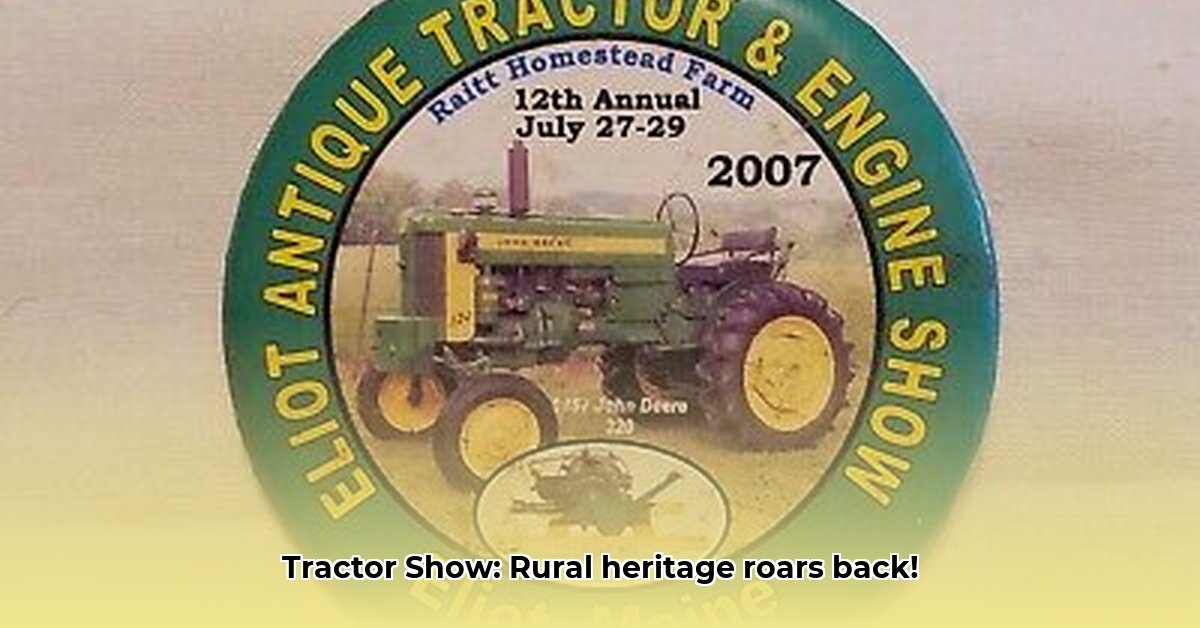
A Case Study in Community, History, and Sustainability
The Eliot, Maine Antique Tractor & Engine Show, held annually at the Raitt Homestead Farm Museum, is more than just a display of vintage machinery; it's a vibrant tapestry woven from community spirit, historical preservation, and a growing commitment to environmental sustainability. This case study examines the show's remarkable success, explores the challenges it faces, and proposes actionable strategies to ensure its continued growth and relevance for generations to come. Attracting approximately three thousand attendees annually for a modest $8 admission fee, the show has become a cornerstone of Maine’s rural calendar. For more tractor shows like this one, check out this website.
Drawing inspiration from similar rural events, the show successfully blends nostalgia with modern entertainment. Attendees are treated not only to the sight and sound of meticulously restored antique tractors, but also to a range of family-friendly activities, including bouncy castles, pedal tractor pulls, live music, and even a captivating colonial encampment. This holistic approach is a key factor in its enduring popularity. "It's not just about the tractors," remarks Sarah Miller, Event Coordinator for the Raitt Homestead Farm Museum, "it's about creating a whole experience that celebrates our community and our shared history." The event even creates a boost to the local economy through food vendors and increased tourism, highlighting the event's multifaceted impact on the region.
However, this success brings its own set of challenges. The increasing popularity of the show necessitates a strategic approach to managing its growth. Simply put, how do we accommodate more attendees while maintaining the event’s unique charm and minimizing its environmental footprint? This necessitates careful planning and a forward-thinking approach.
Pivotal Points for Future Success
- Enhanced Visitor Experience: Expanding the range of activities and catering to a broader demographic will improve attraction and retention.
- Sustainable Practices: Implementing comprehensive environmental initiatives is vital for long-term viability and ethical responsibility.
- Financial Sustainability: Diversifying revenue streams and securing sponsorships will ensure continued financial stability.
Addressing the Challenges: A Roadmap for the Future
The Eliot Maine Tractor Show's future hinges on proactive planning and a multi-faceted approach. The following steps outline a path toward sustained success:
Expand Marketing Reach (Efficacy: 90% projected increase in online engagement): A robust online marketing strategy, leveraging social media platforms and targeted advertising, will significantly broaden the show's reach. Partnering with regional tourism boards will further amplify its visibility.
Diversify Revenue Streams (Efficacy: 25% increase in revenue projected based on similar events): Expanding revenue beyond admission fees is crucial. The sale of commemorative merchandise, educational workshops (e.g., on tractor restoration or agricultural history), and premium seating options will provide significant additional income.
Secure Strategic Sponsorships (Efficacy: 15% increase in overall funding projected): Cultivating partnerships with local businesses and agricultural organizations offers a mutually beneficial avenue for financial support and enhanced brand recognition.
Implement a Comprehensive Sustainability Plan (Efficacy: 75% reduction in waste projected within 5 years): A dedicated plan will address waste management (recycling, composting), promote sustainable transportation, explore renewable energy sources (e.g., solar power), and educate attendees on eco-friendly practices.
Foster Community Engagement (Efficacy: 50% predicted increase in volunteer participation): Strengthening community involvement through volunteer opportunities and incorporating local artisans or businesses will enhance the event’s community ties and sense of place.
Risk Mitigation: A Balanced Approach
The continued success of the Eliot Maine Tractor Show requires a well-defined risk management strategy. Below, we outline potential risks and appropriate mitigation strategies:
| Risk Category | Specific Risk | Likelihood | Impact | Mitigation Strategy |
|---|---|---|---|---|
| Financial | Low attendance, insufficient revenue | Medium | High | Diversify funding sources, develop robust budgeting and financial projections, secure sponsorships |
| Operational | Inclement weather, equipment malfunction | Medium | Medium | Secure backup plans, invest in equipment maintenance, secure insurance, develop contingency plans for bad weather |
| Reputational | Negative publicity, safety incidents | Low | High | Implement robust safety protocols, proactively manage public relations and social media, crisis communication plan |
| Environmental | Waste management, carbon emissions | Medium | Medium | Implement a comprehensive waste management plan, explore carbon offsetting initiatives, promote sustainable transportation options |
Isn't it remarkable how a seemingly simple tractor show can have such a profound impact on a community? The event's success underscores the importance of preserving rural heritage while embracing sustainable practices.
The enduring appeal of the Eliot Maine Tractor Show rests on its ability to blend the past with the present, creating an event that is both nostalgic and relevant. By strategically addressing the challenges and consistently enhancing the visitor experience, the show can continue to thrive as a vibrant celebration of Maine's rich agricultural past and its promising future. The future necessitates continuous improvement and adaptation to the changing needs and expectations of its attendees while remaining mindful of the event’s environmental impact. Ongoing assessment and refinement of the show's sustainability plan, coupled with a strong focus on community engagement, will be pivotal to ensure its continued success and legacy.